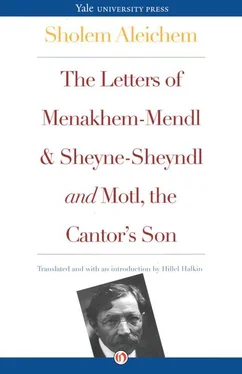Everyone listens and nods and says, “Whew!” One emigrant, a tall, mean-looking fellow with cotton in his ears, asked us:
“What did she look like, that woman with the wig? Religious and pious-like?”
Told that she did, he turned to his wife and said: “Soreh! Did you hear that? It’s the same woman!”
“She should catch the cholera! I wish to God they all did!”
That’s what Soreh said, telling a fine tale of how the woman with the wig set them up, fleeced them of everything, and tried selling them fake tickets to America.
Another emigrant sat up when he heard that. He was a tailor with dark eyes in a pale face and he said: “Fake tickets? Listen to this!”
But before he could tell his story, a fellow named Topolinski said he had a better one. In his town, he said, was a bureau that sold tickets from Lubow to America. A young man was talked into buying one and laid out sixty rubles for a piece of paper stamped with a red eagle. He traveled to Lubow and tried boarding a ship— Just where do you think you’re going? Did someone say ticket? A colored candy wrapper!
I’m getting tired of hearing about tickets. I like emigrants, but tickets are something else. I’d rather spend my time with a boy my age I met on the train to Cracow. His name is Kopl and he has a harelip. He got it from falling off a ladder. He swears it didn’t hurt, even though there was lots of blood. And as if splitting a lip wasn’t bad enough, he was also given a tanning from his father. If you haven’t already guessed, that’s the mean-looking man with the cotton in his ears. And Kopl’s mother is the woman called Soreh. His parents, he says, were once rich. They were rich until the pogrom.
I asked Kopl about that. The emigrants are always talking about pogroms, but I could never figure out what one was. He said: “You don’t know what a pogrom is? What a dummy! They have them everywhere. Anyone can start one and they last for three days.”
“But what are they? A kind of fair?”
“What kind of fair? Some fair! It’s breaking windows. Smashing furniture. Ripping pillows. The feathers fly like snowflakes.”
“But why?”
“Why yourself! Because, that’s why. And they don’t just wreck houses. They smash shops and loot and rob and shoot and throw it all in the street and douse it with kerosene and set it on fire.”
“You’re kidding.”
“I’ll bet you think I’m making it up! And when there’s nothing left to rob, they go from house to house with axes and clubs and iron pokers, singing and whooping. The police go with them and they shout, ‘Kill the kikes, boys!’ If they catch you, they beat you up and cut your throat and fill you with holes …”
“Why me?”
“What do you mean, why you? Because you’re a Jew.”
“But how come?”
“How come yourself! It’s a pogrom.”
“So what if it is?”
“Get out of here, you dunce! It’s hopeless talking to you.”
That’s what he said, Kopl, turning away and sticking his hands in his pockets like a grown-up. It made me sore to see him act so high-and-mighty. I didn’t say anything, though. I just thought, “Wait and see, you big shot, you’ll need me yet,” and I let a few minutes go by. Then I went back to him and started a conversation. I asked him if he knew German. He just laughed at that. “Who doesn’t know German? It’s the same as Jewish.”
“Oh, yeah? Well, if you know it so well, suppose you tell me how you say horseradish.”
He laughed so hard he nearly choked.
“What do you mean, how do you say horseradish? Horseradish is horseradish!”
“That shows how much you know.” “So how do you say it?” I’d be darned if I could think of it myself, so I went and asked Elye.
“Horseradish?” he says. “How would you like some right in your puss?”
Elye must have been in a bad mood. He gets that way when he has to take money from his secret pocket. Pinye laughed at him. Then they began to fight. I looked for a place on the floor between our bundles and went to sleep.
Nothing has come of our stay in Cracow. We haven’t even seen the Committee. The emigrants have told us it’s a waste of time. As soon as you get there, they say, the runaround begins. First, they write down how old you are. Then they send you to the doctor for an examination. Then they tell you to come back. When you do, they ask, “What are you here for?” “We were told to come,” you say, “so we came.” That gets you a scolding for wanting to go to America. “Where are we supposed to go?” you ask. “In what holy book is it written,” they answer, “that you have to go anywhere?” You tell them a little story about a pogrom. “It’s your own fault,” they say. “Look at how one of your young Russians stole a roll in the park the other day.” “Maybe he was hungry,” you say. “And what about your Russian who attacked his wife in the street yesterday?” they ask. “The police had to be called.” “She’s not to blame,” you say. “She happened to spot her husband, who had run away from home. She caught him and made a scene when he tried getting away.” “But why do all your Russians dress in rags?” they ask. “That’s all they can afford,” you say. “Give them better clothes and they won’t wear rags.” All they give you is another lecture.
That’s what the emigrants tell us. We’re fortunate, they say, not to have needed any favors until now. My mother says we wouldn’t need one now either if not for our linens. She’d be as happy as the Kaiser’s wife if not for them. What will we do in America without them?
That’s what she says, my mother, wringing her hands and crying. My brother Elye yells:
“Already? Crying again? It seems you’ve forgotten that we’ll soon be in America and you have to take care of your eyes!”
If you think that means we’re getting close, think again. We have a whole lot of traveling still ahead of us. Don’t ask me where, but I knew the names of some of the places from the emigrants: Hamburg, Vienna, Paris, London, Liverpool …
Hamburg’s a town they’d like to see go up in flames. It’s worse than Sodom, they say. As soon as you arrive, you’re made to take a bath. Being arrested would be more fun. You won’t find scoundrels like Hamburg’s anywhere. That’s what all the emigrants say, so we’ve decided to head for Vienna. In Vienna, we’ve heard, there’s a Committee that acts like one.
Committee or not, we’re going to Vienna. Ever hear of the place? Be patient and I’ll tell you all about it.
GOD IS A FATHER AND VIENNA IS A TOWN
“Vienna — what a town!”
That’s my brother Elye. Pinye goes him one better:
“A town? A city to beat all!”
Even the women, who never like anything, have to admit Vienna is a city. My mother has taken out her silk scarf in its honor. Brokheh wears her Sabbath dress with her black lace shawl and long earrings. With her freckled face she looks like a ginger cat.
You’ve never seen a ginger cat dressed in black? Well, I have. Our neighbor Pesye’s boys used to dress their cat up. You may remember her — Feyge-Leah the Beadle’s Wife, her name was. Once they put a black skullcap on her. They tied it to her head with two bands, attached a dust rag to her tail, and let her loose. The skullcap was so big it slipped over her eyes and the dust rag drove her crazy. Feyge-Leah ran around like mad, bouncing off the walls and smashing things. Did those boys catch it!
Bumpy caught it the worst. That’s Hirshl. He’s one crazy kid, Hirshl is. You may as well whip a wall. I miss him the most. Maybe we’ll meet up in America. We’ve heard that Pesye, Moyshe, and the whole gang are going there too. First they laugh at us, then they follow us.
Читать дальше












